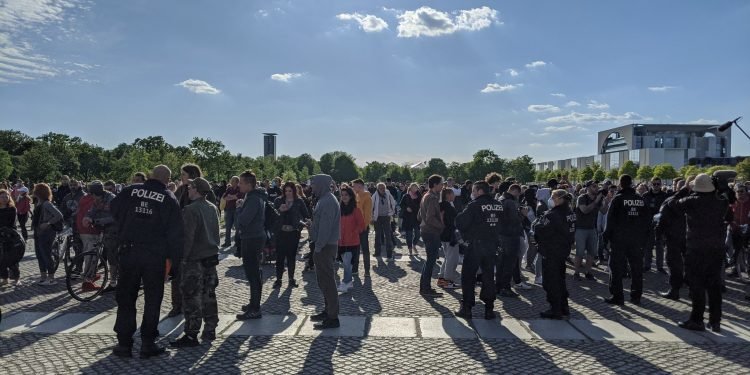Brussels (Brussels Morning) About 20,000 protesters gathered in Leipzig, Germany, to protest against restrictions imposed with the aim of curbing the spread of coronavirus on Sunday, RFI reports. The protest was marred by violence, with 31 protesters arrested.
Germany’s Minister of Justice and Consumer Protection Christine Lambrecht claimed the protesters mocked and defied science by their actions. She blamed “far-right incitement” for the disturbances and asserted that nothing could justify what happened in Leipzig. She pointed out that some protesters had attacked police and members of the press. Most of the protesters were not wearing masks, failed to observe social distancing and ignored police orders to disperse, she added.
According to the police, the demonstrators, rather than dispersing as ordered, went marching along one of Leipzig’s main thoroughfares, hurling objects including fireworks as they made their way as well as attacking police and journalists. Police authorities said officers recorded 102 crimes at the protest, including 13 instances of bodily harm, with 32 attacks against journalists.
Germany’s Minister of Foreign Affairs Heiko Maas stressed that protesters who endanger their fellow citizens, attack police and media, set fire to barricades at counter-demonstrations and spread extreme-right hate do not qualify for protection under under provisions of the German Constitution. Chancellor Angela Merkel’s spokesman Steffen Seibert pointed out that those who protest against restrictions must abide by restrictions.
According to local media, neo-Nazi supporters were among the protesters, as were local far-right figures. The DPA pointed out that protesters chanted “peace, freedom, no to dictatorship” and “Merkel must go.” AFP noted that some protesters waved banners of the pre-WWII German Empire, beloved by nationalists and the far-right.
Protest organisers called for immediate lifting of restrictions on fundamental rights, France24 reported Saturday. While the German state of Saxony, where Leipzig is located, is considered a stronghold of the far-right, organisers of the protest described themselves as free thinkers and insisted that they represented a wide range of social and political movements.
German authorities have been keeping a close eye on demonstrators since some forced their way past barriers and reached the national parliament in late August.
SOURCE




